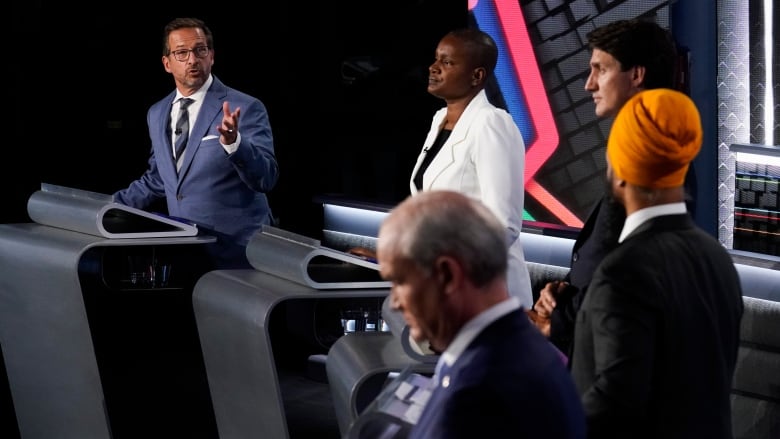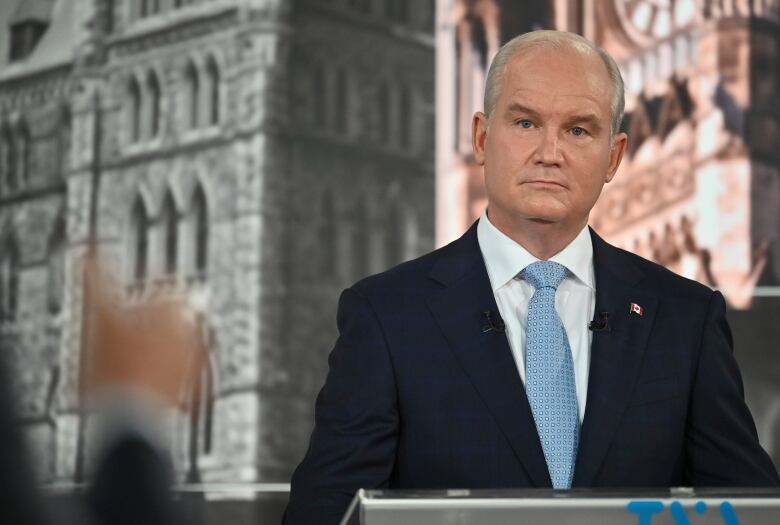Nearly 1 in 3 Canadians don't know who won English debate: Vote Compass
Many say debate won't sway their vote, although Conservatives appear happy with O'Toole's performance

The federal party leaders traded barbs between themselvesand, at points, with the moderatorsduring Thursday night's leaders'debate and nearly a third of Canadians watching at home have no idea who won, according to a Vote Compass question of the day.
This civic engagement tool, which is running on CBC News and Radio-Canada throughout the campaign, asked users who they think won based on what they saw, heard and read.
- Have an election question for CBC News? Email ask@cbc.ca. Your input helps inform our coverage.
About 32 per cent of participantswho watched the debatesaid they didn't know who came out on top.
Of those who did pick a winner, Conservative Erin O'Toole came first with 21 per cent and Liberal Justin Trudeau came second with 18 per cent.
Here are the rest of the results:
The lack of a knockout punch in the English debateone day after the French-language debate also failedto produce a clear winneris likely to keep the election close in the days leading up to the Sept. 20 vote.
"None of the leaders was able to leverage the debate to win the hearts and minds of their opponents," saidClifton van der Linden, an assistant professor of political science at McMaster University and chief executive officer of Vox Pop Labs, the organization that runs Vote Compass.
- Find out who's ahead in the latest polls with our Poll Tracker.
- Compare the party platforms and see where the parties stand on the issues important to you.
According to Vote Compass's results, about 42 per cent said Thursday's debate wouldn't influence their vote, compared to 30 per cent who said it was very likely to inform the way they cast their ballot. Men were more likely than womento say it wouldn't change their mind 45 per cent, compared to 39 per cent of women.
Those who indicated they intendto vote for the Green Party were most likely to say the debate would factor into their decision.
About 64 per cent of People's Party of Canada supporterssaid the debate would have no effect on their vote.The party's leader, Maxime Bernier, was not allowed to participate in the debate.
More than half of those who indicated they plan to support the Bloc Qubcoisalso said the debate wouldn't sway their decision, even after leaderYves-Franois Blanchet's tense exchange with the moderator over Quebec's Bill 21.
Conservative supporters most likely to say their leader won

Those who went into the debate having chosen a party were more likely to say their preferred leader won the debate. But not all of the leaders enjoyed strong reviews from their supporters.
Vote Compass results show NDP LeaderJagmeet Singhis seen as the most competent and trustworthy leader overall; 39 per cent of people who intend to vote NDPsay he won the debate. Another 38 per cent of NDP supporters said they didn't know who won.
According to 66 per cent of those who indicated they plan to support the Conservatives, O'Toole won the night. About52 per cent of Green supporters saidPaul won.
About 47 per cent of Liberal supporters said Trudeau won the debate, while another34 per cent of Liberal supporters saidthey didn't know who won.
Van der Linden said O'Toole's perceived success may be buoyed by the fact that his party has climbed in the polls since the election was called.
"It's often the case that supporter of a party that appears to have momentum in the polls [is] more satisfied with the performance of the party leader they support," he said in an email.
"My suspicion is that Liberal and NDP supporters were hoping that their candidates were going to knock it out of the park and spur a major shift in current polling trends. The results probably reflect their disappointment that this doesn't appear to have happened."
- Use Vote Compass to compare the party platforms with your views.
Developed by a team of social and statistical scientists from Vox Pop Labs, Vote Compass is a civic engagement application offered in Canada exclusively by CBC/Radio-Canada. The findings are based on 2,627 respondents who participated in Vote Compass on Sept. 9.
Unlike online opinion polls, respondents to Vote Compass are not pre-selected. Similar to opinion polls, however, the data are a non-random sample from the population and have been weighted in order to approximate a representative sample. Vote Compass data have been weighted by gender, age, education, and partisanship to ensure the sample's composition reflects that of the actual population of Canada according to census data and other population estimates.













_(720p).jpg)


 OFFICIAL HD MUSIC VIDEO.jpg)
.jpg)



























































































